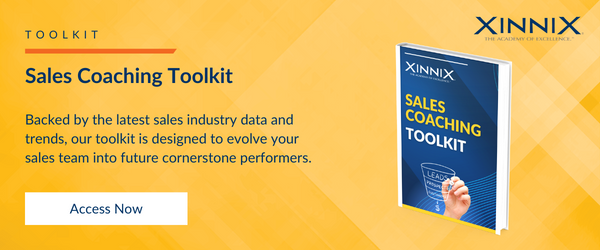Sales and objections go together; you can’t have one without the other.
Successful sales professionals have the skills and abilities to overcome objections, but they didn’t start that way. It is a learned process that often requires training or coaching.
Common Objections You’ve Probably Heard
As a sales professional, you probably know this statistic all too well — 60% of customers say no four times before finally making a purchase. Usually, the no is one of these:
“It costs too much.”
Successful salespeople need to learn how to overcome price objections since cost and budget are one of the most frequent objections you will face.
A solid value proposition can increase your closed/won deals.Part of that means explaining the cost of inaction and the potential return on investment (ROI).
“This isn’t the right time.”
Comments about being too busy, not planning purchase until the next fiscal quarter or focusing on other things at this time typically mean one of two things — either there truly is a barrier to making the purchase right now, or the prospect is making an excuse to end the conversation.
Asking follow-up questions will help you determine how to respond, and the answers will help you answer important questions. Is this a qualified prospect? Will your product or service help solve the problems making this a bad time? Should you reach out to them again when the issues aren’t a barrier?
“I don’t know anything about your company, and I’m not the decision-maker anyway.”
An ounce of prevention is worth a pound of cure. You can minimize the number of times you hear “I don’t know or trust you” by increasing client referral sources. When you hear that phrase, take it as an opportunity to build a relationship with the prospect, share valuable information and advice and become a consultant who can solve their pain points.
If you have reached a prospect who doesn’t have the authority to make the decision, the solution is straightforward. You can overcome objections like these by simply asking to speak to the correct person or conducting research to find out who that person is.
“I don’t need it.”
Often, this objection arises when your prospect doesn’t understand what you are selling or how it can benefit them.
Although you may be tempted to launch into a more in-depth description, the better option is to use open-ended questions to learn more about them to help you determine how to best phrase your explanations. This give-and-take, lets you put the prospect at ease and explain why it's worth making the change.
5 Tips for Overcoming Objections in Sales
The best salespeople have developed a strategic approach to overcoming objections when closing a sale. Here are five key things to remember before and during every conversation to help overcome sales objections:
1. Anticipate Objections
Take time to develop a list of all the objections you might hear. Don’t just think about them, write them down and determine the best responses.
Then — practice! People learn best by doing; you should practice delivering your responses until they come naturally to you. Start practicing by yourself, then partner with a colleague, friend or family member. Give them the list of objections you created and the instructions to try to trip you up.
Maintain this list as an evergreen document that you update regularly.
2. Prepare Resources
You probably already have quite a few sales resources, but you may need to organize them for easy access or even have ones relevant to all of the common objections.
If you haven’t developed case studies or documented client examples, this is the time to do it. If you can, create a resource for each of your buyer personas and possibly even develop versions appropriate to common sales objections.
3. Use Active Listening
Once you are prepared, it is time for your first chat with a prospect, confident you will overcome their objections.
Remember that sales is a two-way conversation that forms the foundation of a relationship. Talk less and listen more, using these active listening skills:
- Listen to understand instead of planning a response.
- Repeat what you heard to make sure you understand.
- Validate any concerns that were brought up.
- Ask open-ended follow-up questions.
4. Complete Next Steps
Sales is a process that typically extends across multiple interactions. Don’t leave a meeting without planning the next steps and then completing those action items immediately afterward. If the deal is still open, schedule your next conversation, either another call or a promise to email resources that pertain to any concerns raised during the meeting.
Hopefully, you will be able to celebrate a success after the meeting, either winning a deal or even moving the prospect further along your sales pipeline. At the same time, you need to look for opportunities to improve your approach to overcoming objections.
5. Review Each Call
Analyze each concern your prospect brought up in the meeting.
If it is missing from your list of common objections from step one, add it and note how you responded. Did you handle it well? In retrospect, are there things you could have said differently or points you missed?
If the concerns were already on your list, ask the same questions. This will allow you to keep an updated list so you can continuously improve your skills.
Overcoming Customer Objections Sales Training
As a leader on your sales team, helping other team members learn to navigate objections should include regular practice and training. Sometimes, knowing just how to provide the coaching needed to create the mindset shift necessary for lasting change can be challenging.
At XINNIX®, we understand the challenges and have put together the Ultimate Sales Coaching Toolkit to help, including robust downloadable guides, quick resources with immediately applicable tips and tricks and more.



